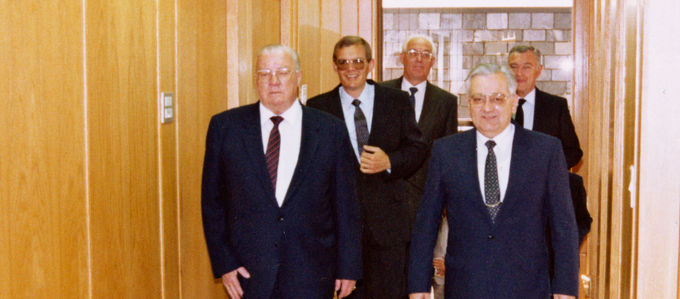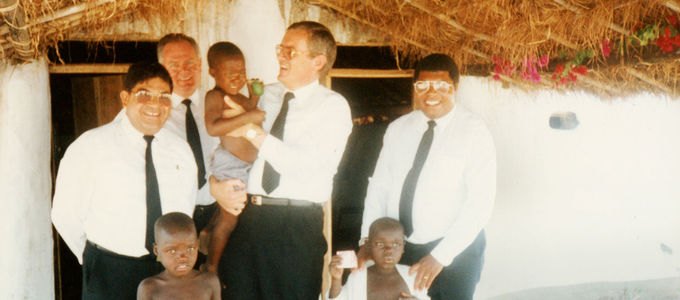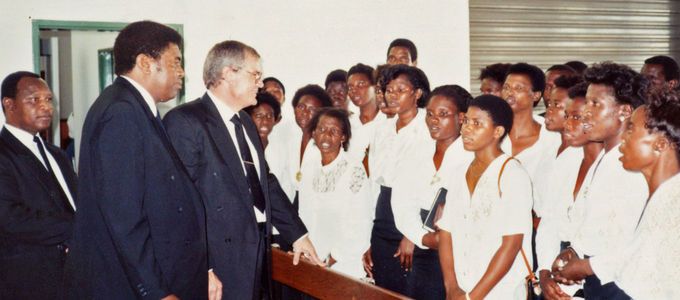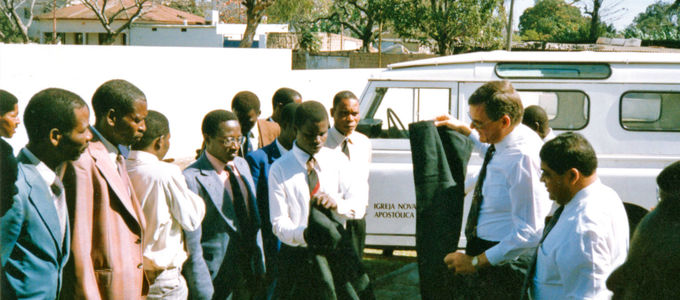Johann R. Kitching Jr.: a champion with vision

“Unity in diversity” was one of his big topics. And this is reflected in the legacy that he left the New Apostolic Church, the result of decades of dedicated work: he formulated the international Church’s Vision and Mission Statements. Today, District Apostle Kitching would have turned 65 years of age.
On Wednesday, 7 March 2012, District Apostle Johann R. Kitching, who had just retired from his ministry, died in a tragic accident. He drowned while fishing at Buffelsbai in South Africa. Chief Apostle Leber showed himself sad and shocked at the time, “We will always treasure District Apostle Kitching. He was a friendly man to all people and our friend.” He was a strategic thinker, an attribute that made him a valuable member on a number of international project groups, and where he made important contributions.
With foresight and perseverance
His most enduring legacy are the Vision und Mission Statements of the New Apostolic Church, which were released in 2007. These fundamental statements are a kind of a code of practice for Church life. What is the New Apostolic Church to be like? What is its objective? What purpose does the Church serve?
The New Apostolic Church has Johann R. Kitching to thank for its Vision und Mission Statements. With a great deal of foresight and perseverance he managed to filter out these important sentences during a number of workshops, and finally put them up for vote.
The objective and goal of the Church
Today the Vision and Mission Statements are a firm component of our self-conception and are part of the foreword of the Catechism of the New Apostolic Church. The Vision and Mission Statements of the New Apostolic Church are as follows:
- Vision: A church in which people feel at home and, inspired by the Holy Spirit and their love for God, align their lives to the gospel of Jesus Christ and thus prepare themselves for His return and eternal life.
- Mission:Reaching out to all people in order to teach them the gospel of Jesus Christ and to baptize them with water and the Holy Spirit. Providing soul care and cultivating a warm fellowship in which everyone shall experience the love of God and the joy of serving Him and others.
“Unity in diversity”
The formulation of this guiding principle came at the height of his work in a subject area that had always been close to his heart and about which he had often written in Church publications: Harmony in diversity.
“How is it possible to lead a Church that is comprised of so many nations and which unites all the differences in it,” Johann Kitching asked in an article published in 2005. His answer in short form is: by taking note of the diversity and reacting with consideration and respect, seeking the unifying power of the gospel by thinking and acting in the mind of Jesus, and by acknowledging the Apostle ministry as the binding element.
District Apostle for 23 years
Johann R. Kitching Jr. was born on 23 July 1950 in Parow, a northern suburb of Cape Town (South Africa). When his father became a District Elder the family moved to Claremont. The central congregation was divided in 1979 because of its size, and Johann R. Kitching was appointed rector of the newly established congregation of Southfield. On 2 October 1988 he was ordained as a District Apostle by Chief Apostle Richard Fehr. District Apostle Johann R. Kitching had served as the highest representative of the Church in South East Africa for 23 years, and was one of the longest-serving District Apostles.
“District Apostle Kitching’s sermons were always very substantial, refreshing, and even compelling,” Chief Apostle Fehr wrote in his obituary. “He was the first who made an appearance on television. He gave a brief explanation about our Church and then conducted a short service, which could be followed on national television. His contributions concerning the leadership of the Church were always constructive, and he was far ahead of some in his thinking.”


























